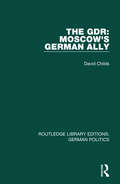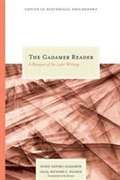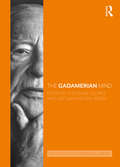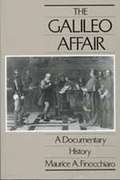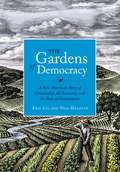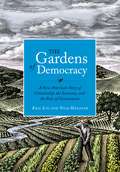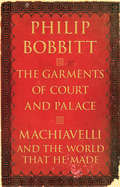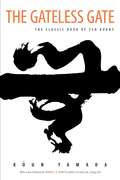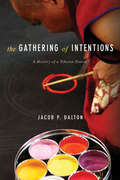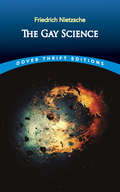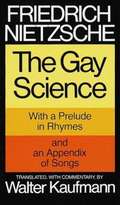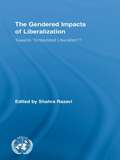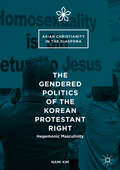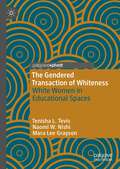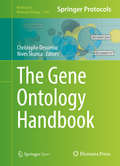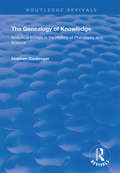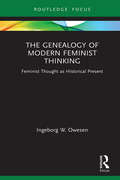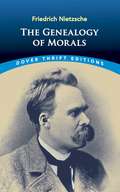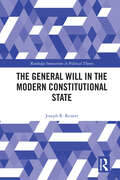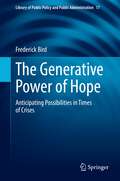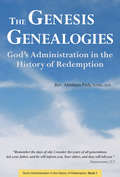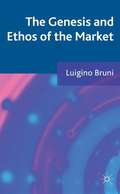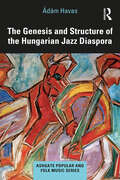- Table View
- List View
The GDR: Moscow's German Ally (Routledge Library Editions: German Politics)
by David ChildsWidely praised in its first edition, the second edition of The GDR was updated to cover events through the spring of 1988, examining in particular the impact of new leadership in both Bonn and Moscow and of the changing world economy on the prospects of the GDR.
The Gadamer Reader: A Bouquet Of The Later Writings
by Hans-Georg Gadamer Richard E. PalmerThe German volume Gadamer Lesebuch [A Gadamer Reader] (1997), selected and edited by Jean Grondin in consultation with Hans-Georg Gadamer himself, contains a set of essays that present a cross section of writings by one of the twentieth century's greatest philosophers. The volume begins with an autobiographical sketch and culminates in a conversation with Jean Grondin that looks back over a lifetime of productive philosophical work. The essays not already available in English have here been translated by Richard E. Palmer, a respected translator of Gadamer's writings. The sixteen essays contained in the Lesebuch are augmented here by three other essays: Gadamer's last essay on Derrida, "Hermeneutics Tracking the Trace" (1994) and two essays on practical philosophy. The Gadamer Reader: A Bouquet of the Later Writings richly conveys the scope and depth of Gadamer's thought, covering the range of his work in hermeneutics, aesthetics, practical philosophy, and essays on Plato, Hegel, and Heidegger. In addition, Palmer offers introductory remarks before each essay that explain its importance in the context of Gadamer's writings and define its key terms. Throughout, in both his translation and commentary, his aim is to make this critically important philosopher as clear and accessible as possible to an English-speaking audience.
The Gadamerian Mind (Routledge Philosophical Minds)
by Theodore GeorgeHans-Georg Gadamer (1900–2002) is one of the most important philosophers of the post-1945 era. His name has become all but synonymous with the philosophical study of hermeneutics, the field concerned with theories of understanding and interpretation and laid out in his landmark book Truth and Method. Influential not only within continental philosophy, Gadamer’s thought has also made significant contributions to related fields such as religion, literary theory, and education. The Gadamerian Mind is a major survey of the fundamental aspects of Gadamer’s thought, with contributions from leading scholars of Gadamer and hermeneutics from around the world. 38 chapters are divided into six clear parts: Overviews Key concepts Historical influences Contemporary encounters Beyond philosophy Legacies and questions. Although Gadamer’s work addresses a remarkable range of topics, careful consideration is given throughout the volume to consistent concerns that orient his thought. Important in this respect is his relation to philosophers in the Western tradition, from Plato to Heidegger. An indispensable resource for anyone studying and researching Gadamer, hermeneutics, and the history of twentieth-century philosophy, The Gadamerian Mind will also be of interest to those in related disciplines such as religion, literature, political theory, and education.
The Galileo Affair: A Documentary History
by Maurice A. FinocchiaroThis book provides a documentary history of the series of developments which began in 1613 and culminated in 1633 with the trial and condemnation of Galileo.
The Gardens of Democracy
by Nick Hanauer Eric LiuAmerican democracy is informed by the 18th century’s most cutting edge thinking on society, economics, and government. We’ve learned some things in the intervening 230 years about self interest, social behaviors, and how the world works. Now, authors Eric Liu and Nick Hanauer argue that some fundamental assumptions about citizenship, society, economics, and government need updating. For many years the dominant metaphor for understanding markets and government has been the machine. Liu and Hanauer view democracy not as a machine, but as a garden. A successful garden functions according to the inexorable tendencies of nature, but it also requires goals, regular tending, and an understanding of connected ecosystems. The latest ideas from science, social science, and economics—the cutting-edge ideas of today--generate these simple but revolutionary ideas: True self interest is mutual interest. (Society, it turns out, is an ecosystem that is healthiest when we take care of the whole.) Society becomes how we behave. (The model of citizenship depends on contagious behavior, hence positive behavior begets positive behavior.) We’re all better off when we’re all better off. (The economy is not an efficient machine. It’s an effective garden that need tending. Adjust the definition of wealth to society creating solutions for all.) Government should be about the big what and the little how. (Government should establish the ideas and the goals, and then let the people find the solutions of how to make it happen.) Freedom is responsibility. (True freedom is not about living some variant of libertarianism but rather an active cooperation a part of a big whole society; freedom costs a little freedom.) The Gardens of Democracy is an optimistic, provocative, and timely summons to improve our role as citizens in a democratic society.
The Gardens of Democracy: A New American Story of Citizenship, the Economy, and the Role of Government
by Eric Liu Nick HanauerAmerican democracy is informed by the 18th century's most cutting edge thinking on society, economics, and government. We've learned some things in the intervening 230 years about self interest, social behaviors, and how the world works. Now, authors Eric Liu and Nick Hanauer argue that some fundamental assumptions about citizenship, society, economics, and government need updating. For many years the dominant metaphor for understanding markets and government has been the machine. Liu and Hanauer view democracy not as a machine, but as a garden. A successful garden functions according to the inexorable tendencies of nature, but it also requires goals, regular tending, and an understanding of connected ecosystems. The latest ideas from science, social science, and economics--the cutting-edge ideas of today--generate these simple but revolutionary ideas:True self interest is mutual interest. (Society, it turns out, is an ecosystem that is healthiest when we take care of the whole.)Society becomes how we behave. (The model of citizenship depends on contagious behavior, hence positive behavior begets positive behavior.)We're all better off when we're all better off. (The economy is not an efficient machine. It's an effective garden that need tending. Adjust the definition of wealth to society creating solutions for all.)Government should be about the big what and the little how. (Government should establish the ideas and the goals, and then let the people find the solutions of how to make it happen.)Freedom is responsibility. (True freedom is not about living some variant of libertarianism but rather an active cooperation a part of a big whole society; freedom costs a little freedom.)The Gardens of Democracy is an optimistic, provocative, and timely summons to improve our role as citizens in a democratic society.
The Garments of Court and Palace: Machiavelli and the World That He Made (Books That Shook The World)
by Philip BobbittThe Prince, a political treatise by the Florentine public servant and political theorist Niccolo Machiavelli is widely regarded as the single most influential book on politics-and in particular on the the politics of power-ever written.In this groundbreaking book, Philip Bobbitt explores this often misunderstood work in the context of the time. He describes The Prince as one half of a masterpiece that, along with Machiavelli’s often neglected Discourses prophesies the end of the feudal era and describes the birth of the neoclassicalRenaissance State. Using both Renaissance examples and cases drawn from our current era, Bobbitt situates Machiavelli’s work as a turning point in our understanding of the relation between war and law as these create and maintain the State. This is a fascinating history and commentary by the man Henry Kissinger called "the outstanding political philosopher of our time."
The Gateless Gate
by Ruben L. Habito Koun YamadaIn The Gateless Gate, one of modern Zen Buddhism's uniquely influential masters offers classic commentaries on the Mumonkan, one of Zen's greatest collections of teaching stories. This translation was compiled with the Western reader in mind, and includes Koan Yamada's clear and penetrating comments on each case. Yamada played a seminal role in bringing Zen Buddhism to the West from Japan, going on to be the head of the Sanbo Kyodan Zen Community. The Gateless Gate would be invaluable if only for the translation and commentary alone, yet it's loaded with extra material and is a fantastic resource to keep close by: An in-depth Introduction to the History of Zen Practice Lineage charts Japanese-to-Chinese and Chinese-to-Japanese conversion charts for personal names, place names, and names of writings Plus front- and back-matter from ancient and modern figures: Mumon, Shuan, Kubota Ji'un, Taizan Maezumi, Hugo Enomiya-Lasalle, and Yamada Roshi's son, Masamichi Yamada. A wonderful inspiration for the koan practitioner, and for those with a general interest in Zen Buddhism.
The Gathering of Intentions: A History of a Tibetan Tantra
by Jacob DaltonThe Gathering of Intentions reads a single Tibetan Buddhist ritual system through the movements of Tibetan history, revealing the social and material dimensions of an ostensibly timeless tradition. By subjecting tantric practice to historical analysis, the book offers new insight into the origins of Tibetan Buddhism, the formation of its canons, the emergence of new lineages and ceremonies, and modern efforts to revitalize the religion by returning to its mythic origins.The ritual system explored in this volume is based on the Gathering of Intentions Sutra, the fundamental "root tantra" of the Anuyoga class of teachings belonging to the Nyingma ("Ancient") school of Tibetan Buddhism. Proceeding chronologically from the ninth century to the present, each chapter features a Tibetan author negotiating a perceived gap between the original root text—the Gathering of Intentions—and the lived religious or political concerns of his day. These ongoing tensions underscore the significance of Tibet's elaborate esoteric ritual systems, which have persisted for centuries, evolving in response to historical conditions. Rather than overlook practice in favor of philosophical concerns, this volume prioritizes Tibetan Buddhism's ritual systems for a richer portrait of the tradition.
The Gay Science
by Friedrich Nietzsche Et. Al."God is dead. God remains dead. And we have killed him. . " This is the book in which Nietzsche put forth his boldest declaration. It is also his most personal, featuring some of the author's most important discussions of art, morality, knowledge, and, ultimately, truth.
The Gay Science: With A Prelude In Rhymes And An Appendix Of Songs (Dover Thrift Editions)
by Friedrich NietzscheAlthough dour in appearance and formidable in reputation, Friedrich Nietzsche was an ardent practitioner of the art of poetry—known in twelfth-century Provençal as "the gay science." This extensive collection of prose and verse offers a sophisticated treatment of the philosophical themes and views central to his thinking, as well as the ideas that proved most influential to later philosophers. Dating from the era when Nietzsche was at the peak of his intellectual powers, most of this book was written just before Thus Spoke Zarathustra, and the rest of it five years later, after Beyond Good and Evil. Zarathustra makes his first appearance in these pages, along with the author's well-known proclamation of the death of God. Readers will find this volume a wellspring for some of Nietzsche's most sustained and thought-provoking discussions of art and morality, knowledge and truth, the intellectual conscience, and the origin of logic, as well as the largest collection of Nietzsche's published poetry.
The Gay Science: With a Prelude in Rhymes and an Appendix of Songs
by Friedrich Nietzsche Walter KaufmannNietzsche called The Gay Science "the most personal of all my books." It was here that he first proclaimed the death of God -- to which a large part of the book is devoted -- and his doctrine of the eternal recurrence.<P><P> Walter Kaufmann's commentary, with its many quotations from previously untranslated letters, brings to life Nietzsche as a human being and illuminates his philosophy. The book contains some of Nietzsche's most sustained discussions of art and morality, knowledge and truth, the intellectual conscience and the origin of logic.<P> Most of the book was written just before Thus Spoke Zarathustra, the last part five years later, after Beyond Good and Evil. We encounter Zarathustra in these pages as well as many of Nietzsche's most interesting philosophical ideas and the largest collection of his own poetry that he himself ever published.<P> Walter Kaufmann's English versions of Nietzsche represent one of the major translation enterprises of our time. He is the first philosopher to have translated Nietzsche's major works, and never before has a single translator given us so much of Nietzsche.
The Gendered Impacts of Liberalization: Towards "Embedded Liberalism"? (Routledge/UNRISD Research in Gender and Development)
by Shahra RazaviIn the last two decades public policies have reflected a drive for accelerated global economic integration ("globalization"), associated with greater economic liberalization. The outcomes have been largely disappointing, even in the estimate of their designers. Rural livelihoods have become more insecure, and the expected growth has rarely materialized. Insecurity is also etched into the growth of informal economies across the world. Yet the economic policy agenda that has been so adverse to many people around the world has also provided new opportunities to some social groups, including some low-income women. In response to widespread discontent with the liberalization agenda, more attention is now being given to social policies and governance issues, viewed as necessary if globalization is to be "tamed" and "embedded". The contributors to this volume address key issues and questions such as whether states have the capacity to remedy the social distress unleashed by liberalization in the absence of any major revision of their macroeconomic policies and whether the proposed social policy reforms can redress gender-based inequalities in access to resources and power.
The Gendered Politics of the Korean Protestant Right
by Nami KimThis book provides a critical feminist analysis of the Korean Protestant Right's gendered politics. Specifically, the volume explores the Protestant Right's responses and reactions to the presumed weakening of hegemonic masculinity in Korea's post-hypermasculine developmentalism context. Nami Kim examines three phenomena: Father School (an evangelical men's manhood and fatherhood restoration movement), the anti-LGBT movement, and Islamophobia/anti-Muslim racism. Although these three phenomena may look unrelated, Kim asserts that they represent the Protestant Right's distinct yet interrelated ways of engaging the contested hegemonic masculinity in Korean society. The contestation over hegemonic masculinity is a common thread that runs through and connects these three phenomena. The ways in which the Protestant Right has engaged the contested hegemonic masculinity have been in relation to "others," such as women, sexual minorities, gender nonconforming people, and racial, ethnic, and religious minorities.
The Gendered Transaction of Whiteness: White Women in Educational Spaces
by Tenisha L. Tevis Naomi W. Nishi Mara Lee GraysonThis book considers the causes and effects of an education field that remains white and gendered and critically examines how the race-gendered power afforded to white women in educational spaces is transacted through instructional practices and interpersonal interactions. White women occupy a complex position in society within systems of white supremacy and patriarchy, participating as both oppressors and oppressed. Emphasizing the consequences of whiteness for educational professionals and students of all racial identities, the chapters in this book offer strategies for identifying and moving beyond the gendered transaction of whiteness, including what white women can do instead and how all educators can work toward transformative antiracist education.
The Gene Ontology Handbook
by Christophe Dessimoz Nives ŠkuncaThis book is open access under a CC BY 4. 0 license. This book provides a practical and self-contained overview of the Gene Ontology (GO), the leading project to organize biological knowledge on genes and their products across genomic resources. Written for biologists and bioinformaticians, it covers the state-of-the-art of how GO annotations are made, how they are evaluated, and what sort of analyses can and cannot be done with the GO. In the spirit of the Methods in Molecular Biology book series, there is an emphasis throughout the chapters on providing practical guidance and troubleshooting advice. Authoritative and accessible, The Gene Ontology Handbook serves non-experts as well as seasoned GO users as a thorough guide to this powerful knowledge system.
The Genealogy of Knowledge: Analytical Essays in the History of Philosophy and Science (Routledge Revivals)
by Stephen GaukrogerFirst published in 1997, this volume expands the analytical philosophical tradition in the face of parochial Anglo-American philosophical interests. The essays making up the section on ‘Antiquity’ share one concern: to show that there are largely unrecognised but radical differences between the way in which certain fundamental questions – concerning the nature of number, sense perception, and scepticism – were thought of in antiquity and the way in which they were thought of from the 17th century onwards. Part 2, on early modern thought, explores the theoretical characterisation of the role of experiment in early modern physical theory through Galileo’s embracing of experiments, along with Descartes’ automata and issues in a relatively neglected but especially intractable part of Descartes’ philosophy: how he conceives of what a successful inference consists in and what it is that makes it successful. The final section deals with the philosophical foundations of physical theory, the distinction between the human and the natural sciences, the philosophical-cum-scientific foundations of Marx’s idea of socialism, and Nietzche’s criticisms of the very notion of science, concluding that Nietzsche’s probing questions cannot be dismissed, as he has opened up some genuinely challenging issues which we ignore at our peril.
The Genealogy of Modern Feminist Thinking: Feminist Thought as Historical Present (Routledge Research in Gender and Society)
by Ingeborg W. OwesenWithin much contemporary feminist theory there is a tendency to forget or ignore its own historicity and consider itself as primarily oriented towards the present. This book explores the historical roots of some of feminism's central concepts and debates, examining the philosophical conditions for feminist thought and taking as its point of departure the dynamic relationship between feminist thought and the history of philosophy. With close attention to the genealogy of key concepts such as equality, sex/gender and difference, alongside discussions of contemporary gender equality policy and contextual understandings of central figures including Wollstonecraft, Beauvoir and Irigaray, The Genealogy of Modern Feminist Thinking provides an analysis of feminism from its origins in the early modern period to its contemporary, post-modern forms. Shedding light on feminism as a product of modernity and establishing it as part of the canon of European intellectual development, this book thus corrects the picture of feminism as a phenomenon that lacks historical continuity, revealing a history characterized by breaks, setbacks and forgetting, in which the forgetting itself forms part of a rich genealogy. As such, it will be of interest to philosophers, sociologists, political theorists and intellectual historians alike.
The Genealogy of Morals (Dover Thrift Editions)
by Friedrich NietzscheWritten in response to a book on the origins of morality by his erstwhile friend Paul Rée, the three essays comprising The Genealogy of Morals -- all three advancing the critique of Christian morality set forth in Beyond Good and Evil -- are among Nietzsche's most sustained and cohesive work.In the first essay -- starting from a linguistic analysis of words such as "good," "bad," and "evil" -- Nietzsche sets up a contrast between what he calls "master" morality and "slave" morality and shows how strength and action have often been replaced by passivity and nihilism. The next essay, looking into the origins of guilt and punishment, shows how the concept of justice was born -- and how internalization of this concept led to the development of what people called "the soul." In the third essay, Nietzsche dissects the meaning of ascetic ideals.It is not Nietzsche's intention to reject ascetic ideals, "slave" morality, or internalized values out of hand; his main concern is to show that culture and morality, rather than being eternal verities, are human-made. Whether or not you agree with all of his conclusions, his writing is of such clarity and brilliance that you will find reading The Genealogy of Morals nothing short of exhilarating.
The General Will
by David Lay Williams James FarrAlthough it originated in theological debates, the general will ultimately became one of the most celebrated and denigrated concepts emerging from early modern political thought. Jean-Jacques Rousseau made it the central element of his political theory, and it took on a life of its own during the French Revolution, before being subjected to generations of embrace or opprobrium. James Farr and David Lay Williams have collected for the first time a set of essays that track the evolving history of the general will from its origins to recent times. The General Will: The Evolution of a Concept discusses the general will's theological, political, formal, and substantive dimensions with a careful eye toward the concept's virtues and limitations as understood by its expositors and critics, among them Arnauld, Pascal, Malebranche, Leibniz, Locke, Spinoza, Montesquieu, Kant, Constant, Tocqueville, Adam Smith, and John Rawls.
The General Will in the Modern Constitutional State (Routledge Innovations in Political Theory)
by Joseph R. ReisertIn The General Will in the Modern Constitutional State, Joseph R. Reisert challenges standard interpretations of Rousseau, according to which his political theory either has nothing to offer the present but a radical critique or commends an illiberal, plebiscitary democracy. Reisert argues that the principles of political right Rousseau sets forth in The Social Contract are correct and that the political institutions of modern constitutional and democratic states substantially satisfy them.Rousseau’s central normative commitments – to popular sovereignty, constitutional law, representative government, the rule of law, periodic elections, universal suffrage, and equal basic rights for all – correspond closely to our contemporary understanding of what political legitimacy requires. Taking seriously Rousseau’s claim that a sort of contract lies at the foundation of every political society, Reisert offers a novel interpretation of willing a general will, arguing that the experience of formulating and acting upon a general will is as common as are the experiences of membership in a civic association and of undertaking any collective activity as a member of such an organization. Reisert expertly demonstrates that, when we recognize that a nation’s true constitution is the content of the people’s general will, we will be able to see how our political institutions (mostly) satisfy Rousseau’s normative principles of political right, and we will also discover new perspectives on constitutional politics and constitutional interpretation.The General Will in the Modern Constitutional State will be of interest to those who study Rousseau’s political thought, history of political thought, constitutionalism, and constitutional theory.
The Generative Power of Hope: Anticipating Possibilities in Times of Crises (Library of Public Policy and Public Administration #17)
by Frederick BirdThis book analyses how and why we are living at a critical moment in the history of human life on earth and explores how we find grounds for the hopes that will enable us to address the challenges and crises of our time. The author analyses hope both practically and philosophically as a generative virtue to realistically discern the situations in which we find ourselves, and imaginatively to anticipate possibilities when the future is unknown and uncertain. The author argues that hope is a mean between anomy, disillusionment, and despair, on the one hand, and wishful thinking, dreaming, and fanaticizing, on the other hand. The book not only examines – and analyzes from a historical perspective - the contemporary crises such as climate change, environmental degradation and its effects such as the social costs of these developments, but also further analyzes the character and micro-dynamics of hope and how it makes a difference in how we manage the crises which inevitably emerge. Though contemporary crises are those we tend to focus on, the author also engages with what is involved in a due regard for history and the relevance of a sense of history for addressing the crises of our time. He shows us what we can learn from revisiting some thoughtful reflections by thinkers like Niebuhr, Jaspers, Camus, and Arendt. Finally, the author shows us what is involved practically in anticipating possibilities, by looking at hope as a social practice and noting how hopeful people make a difference.
The Genesis Genealogies: God's Administration in the History of Redemption
by Abraham ParkA basic part of understanding one's ancestors is knowing when they were born, how long they lived, and when they died. Here in The Genesis Genealogies lies that crucial core information about the forebears of Christianity.Rev. Abraham Park has meticulously analyzed the information in The Book of Genesis. <P><P>Taking the precise date references in Genesis and performing math calculations forward and backward in time, he builds a complete chronological timeline from Adam to the Exodus-allowing us to more deeply understand the layers of meanings that the text offers.
The Genesis and Ethos of the Market
by Luigino BruniA discussion of the anthropological roots of the market, tracing its development using the history of ideas and cultures as well as simple game theory. In his analysis of market ethics Bruni calls for a reconsideration of some of the central tenets of modern political economy, and the need for a new spirit of capitalism.
The Genesis and Structure of the Hungarian Jazz Diaspora (Ashgate Popular and Folk Music Series)
by Ádám HavasIn Hungary, jazz was at the forefront of heated debates sparked by the racialised tensions between national music traditions and newly emerging forms of popular culture that challenged the prevailing status quo within the cultural hierarchies of different historical eras. Drawing on an extensive, four-year field research project, including ethnographic observations and 29 in-depth interviews, this book is the first to explore the hidden diasporic narrative(s) of Hungarian jazz through the system of historically formed distinctions linked to the social practices of assimilated Jews and Romani musicians. The chapters illustrate how different concepts of authenticity and conflicting definitions of jazz as the "sound of Western modernity" have resulted in a unique hierarchical setting. The book's account of the fundamental opposition between US-centric mainstream jazz (bebop) and Bartók-inspired free jazz camps not only reveals the extent to which traditionalism and modernism were linked to class- and race-based cultural distinctions, but offers critical insights about the social logic of Hungary’s geocultural positioning in the ‘twilight zone’ between East and West to use the words of Maria Todorova. Following a historical overview that incorporates comparisons with other Central European jazz cultures, the book offers a rigorous analysis of how the transition from playing ‘caféhouse music’ to bebop became a significant element in the status claims of Hungary’s ‘significant others’, i.e. Romani musicians. By combining the innovative application of Pierre Bourdieu’s cultural sociology with popular music studies and postcolonial scholarship, this work offers a forceful demonstration of the manifold connections of this particular jazz scene to global networks of cultural production, which also continue to shape it.
